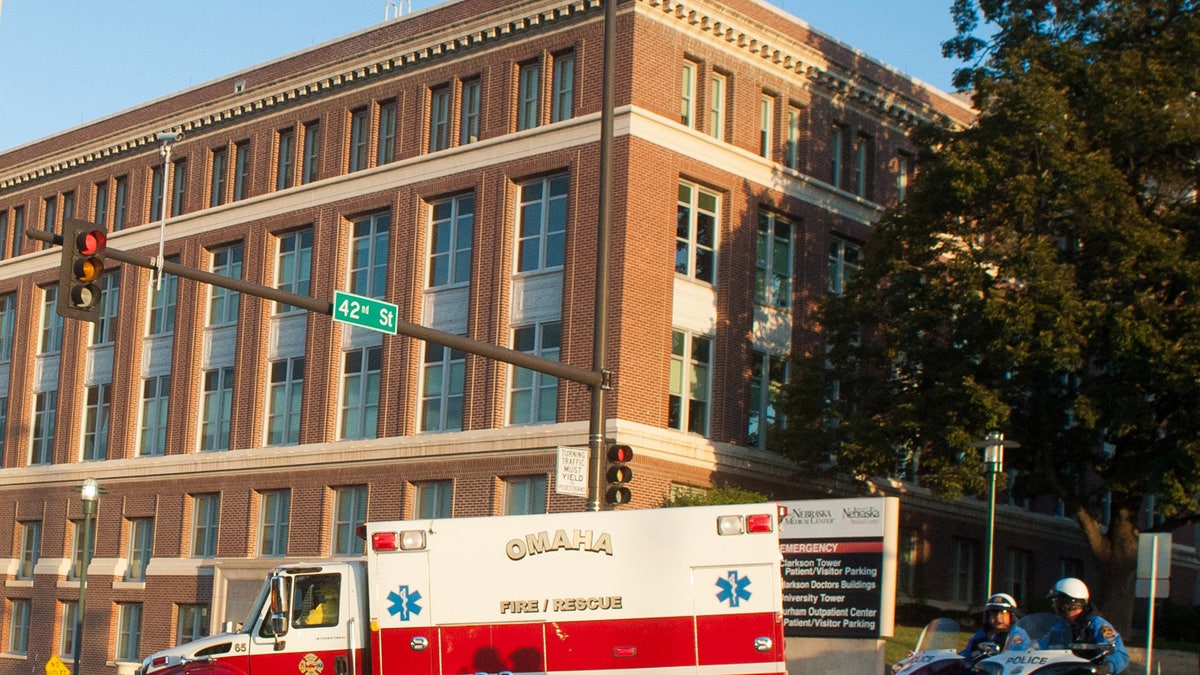
An ambulance transports Ashoka Mukpo, who contracted Ebola while working in Liberia, to the Nebraska Medical Center's specialized isolation unit Monday, Oct. 6, 2014, in Omaha, Neb., where he will be treated for the deadly disease. (AP Photo/Dave Weaver)
An American journalist who contracted Ebola while working in Liberia is now being treated with an experimental drug, the same drug the first Ebola patient diagnosed in the U.S. is receiving.
On Tuesday, Nebraska Medical Center announced Ashoka Mukpo, 33, is being treated with brincidofovir, made by biopharmaceutical company Chimerix.
“After looking at the data on this drug, collaborating with the Centers for Disease Control and Prevention (CDC) and Food and Drug Administration (FDA) and speaking with the patient and his family, we decided this was currently our best option for treatment,” said Dr. Phil Smith, medical director of the Nebraska Medical Center’s Biocontainment Unit. “Every patient is somewhat different, and we believe brincidofovir is the best choice.”
Doctors are looking at other options for treatment as well.
In a press conference Monday, freelance photographer Ashoka Mukpo’s parents said their son was in good spirits and that his condition— which included fever and some nausea— had not changed since he left Liberia.
Mukpo is unsure of how he contracted the virus, but he thinks it may have occurred while he was spray washing something and contamination splashed back on him, his father, Dr. Mitchell Levy said.
“I’ve asked him about it a lot, but he’s not certain,” Levy said.
Mukpo is being cared for by a team of 40 at Nebraska Medical Center.
On Tuesday, a spokeswoman for Texas Health Presbyterian Hospital said the first Ebola patient diagnosed in the U.S., Thomas Eric Duncan, remains in critical condition and that his condition is stable. He is currently on a ventilator and receiving kidney dialysis. Doctors have seen improvement in his liver function, which declined over the weekend, but caution this could vary in coming days. He will continue to receive brincidofovir.
Duncan began receiving the experimental drug on Saturday afternoon, the hospital announced Monday. The drug, which comes in tablet form, is currently undergoing additional tests in laboratory animals infected with Ebola. According to a statement from Chimerix, it was approved by the FDA for use in human Ebola patients on Monday.
Duncan, a Liberian man, arrived in Dallas on Sept. 20 and started to feel ill a few days later while visiting family. On Sunday, Dr. Thomas Frieden, director of the CDC, said he was aware that Duncan's health had "taken a turn for the worse," but he declined to describe Duncan's condition further. He was listed in critical but stable condition Monday.
Frieden told reporters on Sunday that Duncan was apparently not receiving experimental therapies, in part because there are no more doses of ZMapp, a cocktail of three antibodies.
Asked about TKM-Ebola, the drug that Dr. Rick Sacra received in treatment when he was diagnosed with Ebola, Frieden said it "can be quite difficult for patients to take" and "can actually make someone sicker."
Neither supply nor administration is apparently an issue with brincidofovir, which was first developed to treat adenovirus infections in people with weakened immune systems.
"Chimerix has brincidofovir tablets available for immediate use in clinical trials," the company said in a statement. It also said on Monday that the U.S. Food and Drug Administration approved its emergency use for Ebola patients and that it was working to set up clinical trials.
TKM-Ebola is given intravenously. "IV access can be quite challenging with a medically compromised patient," Dr. Christopher Kratochvil, chief medical officer at UNeHealth, parent of the University of Nebraska Medical Center, said in an interview.
Shares in Chimerix rose 4.7 percent on Monday, and shares in TKM-Ebola manufacturer Tekmira fell nearly 19 percent.
Another consideration in the choice of drugs for Duncan might have been safety. Ebola is infamous for causing massive fluid loss, which can lead to electrolyte imbalances that stress the heart and kidneys. Brincidofovir, also called CMX-001, has been tested in more than 1,000 patients without raising safety concerns, including kidney toxicity, the company said.
Chimerix faced a firestorm of criticism this year when it initially declined to provide the drug on a "compassionate use" basis to 8-year-old Joshua Hardy, a Virginia boy who developed a potentially-fatal adenovirus infection after a bone marrow transplant for kidney cancer.
The company relented and enrolled the boy in a clinical trial. He went home from the hospital in July, but the incident led Chimerix to replace its chief executive.
CMX-001 is a compound called a nucleotide analog. Its molecules behave enough like those that form the genetic material (nucleotides) of viruses such as Ebola that the microbes incorporate it into their DNA or RNA, a sister molecule.
But CMX-001 is different enough that, once incorporated, it prevent a virus's genetic material from replicating. That stops the virus from spreading throughout the body.
When West Africa's Ebola outbreak was reported last March, Chimerix sent brincidofovir to government labs, including at the CDC and National Institutes of Health, to be tested against test-tube samples of the Ebola virus. It showed "potent activity," the company said.
Reuters contributed to this report.
